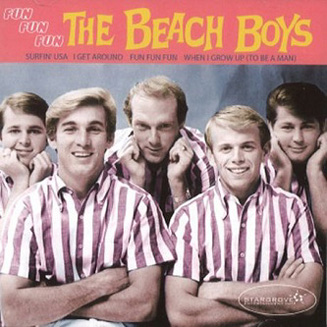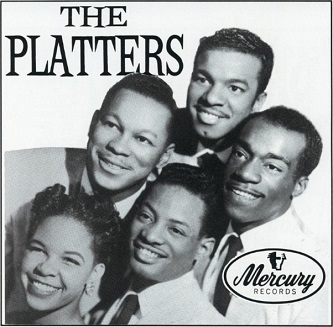BAND REUNIONS

|

|
Music Blasts from the Past: Living History or Inauthentic?
by Danny Martin
(June 2017)
Reflecting on all the rock concerts I've attended in my life, and on the varying degrees to which I found them entertaining, a question comes to mind: how much does authenticity matter?
It's a question that pertains mostly to artists past their prime. Artists at the top of their game, who are popular and putting out new music, will generally deliver in concert what you as a fan deserve and expect: an accurate recreation of the songs you fell in love with, and an energetic performance. With older artists, this can't always be taken for granted. And often, in the case of groups, the personnel aren't even the same. But how much does this really matter? And how does one define 'authenticity'?
A case can be made that brand name is the most important thing that matters to many fans. Axl Rose toured for many years as Guns 'n Roses, despite being the only original member in the band. Many bands of '70's-era stardom, who had soaring, big-voiced frontmen at the helm, now tour with replacement lead singers (Styx, Foreigner, Journey, to name a few). And it is a topic that is complicated by the nebulous definition of band "member." Informational websites for the groups above, and many others, are often careful to distinguish "official members" with live personnel. Sometimes, the acts' original members are emphasized. Is this important to people? Consider how many of us actually remember the pre-Buckingham/Nicks lineup of Fleetwood Mac. Would anyone prefer to see that lineup over the more popular one associated with Rumours and their classic '70's and '80's years? (ED NOTE: in the mid '70's, the band's manager created a fake version of Fleetwood Mac to do touring). Are the lead singers, whose voices are the most identifiable with the hits and most popular era of a group, the most important part of the brand?
The Beach Boys are an interesting case study. Subsequent to Carl Wilson's death in 1998, frontman Mike Love obtained the sole rights to tour with the band name. And, along with long-time member Bruce Johnston and a group of hired guns, he has been touring continuously as The Beach Boys ever since (with the exception of the 50th anniversary tour in 2012 which featured all surviving members). Over the last couple of decades, co-founder and hailed studio/songwriting genius Brian Wilson has also toured, not as heavily but substantially, as a solo artist. His shows, which also include a top-notch supporting band and, most recently, band cofounder Al Jardine and former 70's-era member Blondie Chaplin, essentially amount to a Beach Boys concert as well. All of the aforementioned have been lead vocalists on the group's hit songs, with Love having the quantitative edge, particularly with the beloved car and surf songs of their early years. But what is interesting about Beach Boys fans is the degree to which so many of them despise Mike Love, and deny his contributions to the group. It would appear his own actions, like his infamous speech at their Rock and Roll Hall of Fame Induction Ceremony, and years of other dubious behavior, have turned many against him. The lawsuits with band members have not helped, and perhaps have forced some fans to take sides. Consequently, you can typically find many comments bashing him on Beach Boys message boards, YouTube threads, etc.. And many who go to Wilson concerts swear off seeing any of Love's shows (at one I attended in 1999, Love was met with resounding boos during an introductory video featuring interview clips of him). There is no denying that Wilson is/was the most important character of The Beach Boys' story. But with respect to their present day performances, to say that one's representation of The Beach Boys is more authentic than the other's is not really a fair statement. Both have their strengths: Love's show has his stage presence and showmanship, Wilson's show has the material itself...in addition to most of the biggest Beach Boys hits, his concerts have featured entire renditions of the legendary Pet Sounds and Smile albums, as well as interesting new solo material. Perhaps Love's long time popular villainy has become part of the story, inasmuch as Wilson has emerged as the hero amongst fans, recounting his fascinatingly difficult life and the adversity he has overcome while writing beautiful music. But both possess singing voices that have been challenged by the inevitability of aging. It almost goes without saying that Brian's trademark falsettos of their early years are now handled by alternate personnel, for both touring camps.
The point is, the original artist being there doesn't necessarily guarantee the "authenticity" one might be looking for. I've seen singers deal with the rigors of aging in different ways. Some transpose the songs to a lower key. Frankie Valli, when I saw him in the late '90's, held out his microphone to the audience in "you sing it" fashion, for what seemed like every distinctive falsetto part of every hit song. Bob Dylan went through a particularly bad phase in the mid-'90's when he mostly just mumbled his vocals and played noodle-y solos on his guitar (I remember hearing "All Along the Watchtower" and not realizing what song it was until my friend alerted me to it at its conclusion).
One of the most extreme examples I can think of where the connection with the past has been removed, and where brand name is a questionable representation of the associated act, is with legendary doo-wop group The Platters. Because of the unusual nature in which band members were incorporated when the group formed, and as a result of a series of complex legal battles that ensued, there were at one point over 20 different groups touring under (i.e. cashing in on) the name "The Platters" worldwide, just a few years ago. Which would explain the incarnation I saw in the mid '90's that had only one member old enough to have actually been a Platter in their heyday, and which featured a "music director" with a deep baritone who sang "My Prayer" in a key nowhere near the original recorded version. It was a group with entirely different personnel from the Herb Reed Platters I saw in the mid-2000's, which also featured hired guns singing the tenor lead parts. It should be noted that Reed was the only surviving original member of the 50's-era Platters still touring under that name, at that point, and up until his death in 2012. But as the bass singer for the group, his voice was far from being the recognizable sound associated with "Only You" and "The Great Pretender." That tenor voice actually belonged to Tony Williams, who has been deceased since 1992. As a joke, I imagine what it would be like if all these different incarnations had gotten together for a Union-style album and subsequent tour, as perennial prog-rockers Yes did in the early '90's when past and then-present members joined forces. There are some very This is Spinal Tap qualities about the group's history, like the fact that at one point. some of the members billed themselves as "The Original Platters." But the line "37 people have been in this band" seems to have lost its comedic value as hyperbole.
To add some historical perspective, consider popular music, pre-rock and roll. It used to be more about the song than the particular recording or artist. Publishers made most of their money from sheet music, even well after the invention and mass production of vinyl records. Many families who owned pianos would buy the sheet music and count on their own manual recreation of the songs. In the early days of radio, you could typically hear several different versions of a song, while it was popular. An artist's particular rendition of a song didn't really become important until the early days of rock and roll. So perhaps when we now see the music recreated in different ways by these old groups, we are just seeing a repeat of this phenomenon. The personnel is different, but the song, in a sense, remains the same.
So authenticity does matter, but people define the concept in their own way and by a number of measures: sometimes, it is the voice associated with the hits, sometimes it's the songwriters, sometimes it's tenure with the group (particularly during peak years), and sometimes it's the intangibles that define the aura and mystique of the artist. On concert attendance alone, brand name would appear to be the most important thing to people, but authenticity matters to varying degrees based on one's knowledge of the artist's history, one's technical familiarity with the music, and how much one empathizes with one side or the other when it comes to conflict within a band. Some people want to experience a piece of living history, some just want to be entertained by the performance of the songs they love. Everyone wants to relive how the music made them feel. Some of us take our kids and enjoy passing the history to them. And the more you are willing to make concessions as to the historical accuracy of the performers, whether it's accepting replacement performers or original performers in more limited and age-worn roles, the more likely you are to be fulfilled.
To put this another way, for those of us who hold on to our musical nostalgia, it can be beneficial to cast aside concerns about authenticity. My brother was an even bigger fan of Guns 'n Roses than I back in the 80's, yet he passed up seeing them during their most recent reunion tour because it didn't include Izzy Stradlin. He pointed out that Izzy wasn't just a rhythm guitar player, but a major writer in the band. I wasn't aware of the fact at the time, but it didn't matter... Axl, Slash, and Duff together again after so many years was good enough for me. My brother missed a great show. If they are still touring in their 90's, Brian Wilson will look even more catatonic on stage than he does now, and Mike Love may be cracking the same corny jokes and pestering the crowd to get off our seats and stop "looking like we're at a Lawrence Welk show." But they will have plenty of hired help, and I will still go, and will still take my kids (provided they're willing). I hope Axl is still loud and angry at 75, and whatever key he sings in, I hope he still flashes the middle finger as he vociferates "why don't you just...f@@k off" in the middle of opening number "It's So Easy." And for a brief moment during that primal scream, some of us will be teenagers again, taking in every bit we can.
References:
http://www.celebritydirect.biz/platters/index.htm
http://m.lasvegassun.com/news/2012/aug/15/who-should-be-able-use-platters-name-stage-depends/